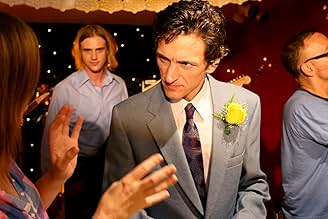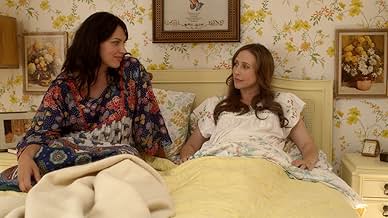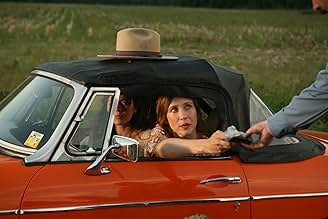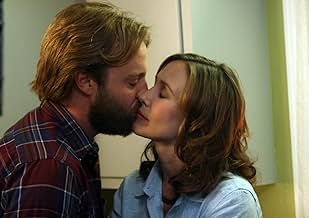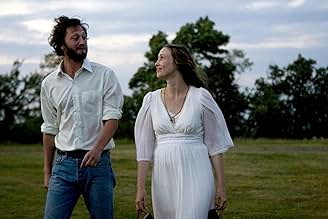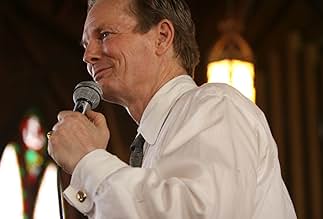IMDb रेटिंग
6.2/10
3.4 हज़ार
आपकी रेटिंग
अपनी भाषा में प्लॉट जोड़ेंA chronicle of one woman's lifelong struggle with her faith.A chronicle of one woman's lifelong struggle with her faith.A chronicle of one woman's lifelong struggle with her faith.
- पुरस्कार
- 1 जीत और कुल 7 नामांकन
फ़ीचर्ड समीक्षाएं
Higher ground is one the finest films on its subject ever made, as well as one of the best films this year. Surprisingly, it's the directorial debut of one of our finest actors, Vera Farmiga. She's been very good in every film in which she's played any role, but is probably best known for her Oscar nominated turn in Jason Reitman's Up in the Air, opposite George Clooney. But for her own film, Farmiga has chosen a very difficult subject – one woman's struggle with her faith; her tenuous relationship with her husband inside a strictly defined religious community; and most important, her personal relationship with God.
The story covers the three-decade spiritual journey (late '50s through '70s) of Corinne, played as a little girl by McKensie Turner, as a teenager by Farmiga's younger sister, Taissa, and as a grown woman by Farmiga herself, in a performance that is brave, nuanced, and emotionally powerful. Hollywood films on this subject can either preach to the choir or have a contemptuous agenda, but Farmiga's film isn't about whether this or that religion is good or bad. It's about faith, and doubt, and finding one's way in life. In fact, this is the best work on the subject since Meryl Streep dazzled us in "Doubt." Here's how it goes: As a little girl, Corinne's pastor shows her how to invite Jesus into her heart, an idea that appeals to her since her home life is marred by a drunken father (John Hawkes) and a mother who has eyes for other men (Donna Murphy). But Corinne doesn't quite know what she's supposed to feel. She does like animals, and she also gives an accordion a try, when a door-to-door salesman pitches one to the family. Corinne's mother says, "She's not musical," to which the salesman quickly replies, "Maybe she hasn't found her instrument yet." This foreshadows Corrine's struggle to find her path to God.
Corinne is intellectually curious and has a talent for writing, and when a young guitarist asks her to write a song with him, she finds herself doing what so many teenagers have done before, and then pregnancy and a wedding follow. Corinne must then put her dreams of a writing career on hold, as she cares for the baby while her husband plays in a rock band. But a near tragic experience convinces them they need to give up this reckless life and join an evangelical Christian church. Corinne wants very badly to feel the Spirit, and to be happy with her husband in this religious community, but she doesn't feel what her pastor preaches, nor what she sees other members feeling. This is both a puzzlement and a torment to her, especially when she makes a good friend, Annika, played wonderfully by Dagmara Dominczyk, to whom loving and feeling God come easily.
This particular Christian community will be one many people recognize; they adhere to the bible's word and are happy to follow a strict patriarchal discipline. As a director, Farmiga does not judge, but those who do not subscribe to this type of religious practice may, and that would be a mistake. These are not bad people, they have chosen a life that works for them; it just may not be a good fit for Corinne. She's smart, studies the bible along with many other books, and she feels she has something valuable to share with the congregation. But when she speaks up, she's admonished by the pastor's wife for "coming very close to preaching and attempting to teach the men." She chafes under this restraint, which seems unreasonable to her. And then a second, very real, tragedy strikes, turning her struggle into a spiritual crisis. I think many people will recognize precisely this experience from their own lives: it is very real.
Farmiga's film does not hurry, the story unfolds slowly, and it also contains a fair amount of humor. I could've died laughing during a scene in which Corinne's marriage counselor tells her about "a dire MacMuffin moment," but it was no laughing matter. There are also many small everyday family scenes that may not seem of much consequence, but every piece of the story is important, so watch and listen carefully, as everything builds to one of the most emotionally powerful endings of any film this year. At the climax, Corinne speaks to the congregation, from her heart, a heart that perhaps gives too much, and also with a mind trying very hard to make sense of what it means to walk "The Higher Ground." In the end, we get a sense that Corinne will find her instrument, and that she will go on to make music with God.
Higher Ground is an excellent film and a brilliant directorial debut by Vera Farmiga, from whom I think we can expect great things in the future. I highly recommend it to all who appreciate literary quality stories that deal honestly with human feelings and relationships.
The story covers the three-decade spiritual journey (late '50s through '70s) of Corinne, played as a little girl by McKensie Turner, as a teenager by Farmiga's younger sister, Taissa, and as a grown woman by Farmiga herself, in a performance that is brave, nuanced, and emotionally powerful. Hollywood films on this subject can either preach to the choir or have a contemptuous agenda, but Farmiga's film isn't about whether this or that religion is good or bad. It's about faith, and doubt, and finding one's way in life. In fact, this is the best work on the subject since Meryl Streep dazzled us in "Doubt." Here's how it goes: As a little girl, Corinne's pastor shows her how to invite Jesus into her heart, an idea that appeals to her since her home life is marred by a drunken father (John Hawkes) and a mother who has eyes for other men (Donna Murphy). But Corinne doesn't quite know what she's supposed to feel. She does like animals, and she also gives an accordion a try, when a door-to-door salesman pitches one to the family. Corinne's mother says, "She's not musical," to which the salesman quickly replies, "Maybe she hasn't found her instrument yet." This foreshadows Corrine's struggle to find her path to God.
Corinne is intellectually curious and has a talent for writing, and when a young guitarist asks her to write a song with him, she finds herself doing what so many teenagers have done before, and then pregnancy and a wedding follow. Corinne must then put her dreams of a writing career on hold, as she cares for the baby while her husband plays in a rock band. But a near tragic experience convinces them they need to give up this reckless life and join an evangelical Christian church. Corinne wants very badly to feel the Spirit, and to be happy with her husband in this religious community, but she doesn't feel what her pastor preaches, nor what she sees other members feeling. This is both a puzzlement and a torment to her, especially when she makes a good friend, Annika, played wonderfully by Dagmara Dominczyk, to whom loving and feeling God come easily.
This particular Christian community will be one many people recognize; they adhere to the bible's word and are happy to follow a strict patriarchal discipline. As a director, Farmiga does not judge, but those who do not subscribe to this type of religious practice may, and that would be a mistake. These are not bad people, they have chosen a life that works for them; it just may not be a good fit for Corinne. She's smart, studies the bible along with many other books, and she feels she has something valuable to share with the congregation. But when she speaks up, she's admonished by the pastor's wife for "coming very close to preaching and attempting to teach the men." She chafes under this restraint, which seems unreasonable to her. And then a second, very real, tragedy strikes, turning her struggle into a spiritual crisis. I think many people will recognize precisely this experience from their own lives: it is very real.
Farmiga's film does not hurry, the story unfolds slowly, and it also contains a fair amount of humor. I could've died laughing during a scene in which Corinne's marriage counselor tells her about "a dire MacMuffin moment," but it was no laughing matter. There are also many small everyday family scenes that may not seem of much consequence, but every piece of the story is important, so watch and listen carefully, as everything builds to one of the most emotionally powerful endings of any film this year. At the climax, Corinne speaks to the congregation, from her heart, a heart that perhaps gives too much, and also with a mind trying very hard to make sense of what it means to walk "The Higher Ground." In the end, we get a sense that Corinne will find her instrument, and that she will go on to make music with God.
Higher Ground is an excellent film and a brilliant directorial debut by Vera Farmiga, from whom I think we can expect great things in the future. I highly recommend it to all who appreciate literary quality stories that deal honestly with human feelings and relationships.
Higher Ground is a story about an honest search for faith in a fearful, posturing world. It is an unpretentious film. It is also Vera Farmiga's directorial debut and it showcases her signature style. She displays astonishing depths, carrying roles with integrity and intelligence. I've always noted that she has an atypical screen glamor that grows in its unfurling. In fact, it's a special beauty but it fits a needed niche. If you have ever walked the path of faith, honestly questing, be prepared for a cathartic, ambiguous denouement that may take you to higher ground. I enthusiastically recommend this soft, sad but lovely journey by cinema.
A lot of folks are posting to point out that HG is just plain boring. I say it's not.
What it is, is mundane. Farmiga set herself a difficult hurdle. She decided that she wanted to set this odyssey in the context of the life of, really, an ordinary woman. And so there's a notable wash of the quotidian over the whole movie; lots of pastels and a paucity of striking drama and color. Who buys a ticket to eat oatmeal? Well, there are a couple of redemptive factors, esthetically speaking.
One thing she does is place flashpoint moments of pretty intense drama, such as when the personality conflict with her husband culminates in violence; a real white-knuckler! And, that being merely a notable punctuation point in the action, a careful tracking shows the flick to be a kind of moderated exposition, ranging from the truly mundane to some pretty challenging stuff; and everything in between and every which way.
HG is an invitation to lovingly and thoughtfully consider those of our brethren who have addressed their existential crises by buying into this particular "out"; socializing themselves into fundamentalism.
Interestingly, the eye of the camera viewing this epic could be the fairly dispassionate eye of a deistic god: For example, I found the scene where our heroine meets with a "prophetic" councilor particularly challenging. It requires that we get off our duffs, roll up our sleeves, and personally address the issue: From whence do persons who promote themselves as social arbiters derive their credentials? Does his firm, unblinking claim to divine calling overrule the intuitions of women who simply feel unfulfilled? HG is, I think, carefully directed to leave you to answer this, and other questions, in the tabernacle of your own heart. This will naturally put off some moviegoers who never really felt that this was the purpose of film.
I'm not kidding: I'm fully aware that this style of filmmaking puts off plenty of people. Farmiga didn't make this film to be popular: She made it to be honest with herself.
And perhaps that's the foundation point of the best recommendation for this flick: How often do you get to see films like that?
What it is, is mundane. Farmiga set herself a difficult hurdle. She decided that she wanted to set this odyssey in the context of the life of, really, an ordinary woman. And so there's a notable wash of the quotidian over the whole movie; lots of pastels and a paucity of striking drama and color. Who buys a ticket to eat oatmeal? Well, there are a couple of redemptive factors, esthetically speaking.
One thing she does is place flashpoint moments of pretty intense drama, such as when the personality conflict with her husband culminates in violence; a real white-knuckler! And, that being merely a notable punctuation point in the action, a careful tracking shows the flick to be a kind of moderated exposition, ranging from the truly mundane to some pretty challenging stuff; and everything in between and every which way.
HG is an invitation to lovingly and thoughtfully consider those of our brethren who have addressed their existential crises by buying into this particular "out"; socializing themselves into fundamentalism.
Interestingly, the eye of the camera viewing this epic could be the fairly dispassionate eye of a deistic god: For example, I found the scene where our heroine meets with a "prophetic" councilor particularly challenging. It requires that we get off our duffs, roll up our sleeves, and personally address the issue: From whence do persons who promote themselves as social arbiters derive their credentials? Does his firm, unblinking claim to divine calling overrule the intuitions of women who simply feel unfulfilled? HG is, I think, carefully directed to leave you to answer this, and other questions, in the tabernacle of your own heart. This will naturally put off some moviegoers who never really felt that this was the purpose of film.
I'm not kidding: I'm fully aware that this style of filmmaking puts off plenty of people. Farmiga didn't make this film to be popular: She made it to be honest with herself.
And perhaps that's the foundation point of the best recommendation for this flick: How often do you get to see films like that?
Catching up on Vera Farmiga's work is my current goal, and seeing as how she directed this one I felt more obligated to see it at this time. She's captivating and heart-breaking, infusing her subtle charm and many nuances to great effect. I don't think the film is all that great, particularly because I see quite a few holes in some of the character relationships and some of the writing arcs, but it's serviceable and Farmiga's directing reminds me somewhat of Sarah Polley's. I do think Farmiga is quite easily the best thing about it, both her directing and acting and for that it's worth a watch. Her younger sister also shows some acting talent.
Congratulations to Ms. Farmiga on such an excellent debut as a director.
As a completely involved in church evangelical Christian, it was exciting to see major elements of my lifestyle portrayed accurately on screen for a change. This film takes a kind and thoughtful middle road, not portraying the Christian life at extremes as it so often is- both negatively in many mainstream films and over the top positive in Christian films.
I wish I could send an email to all my church friends telling them to go see this film. But, as the film intimates, there are social and cultural taboos present within Christian churches. Some of the dialog and a few of the images would be so offensive to a small minority of my Christian friends that I would not dare to broadcast a recommendation but rather discreetly recommend it to those who would not be offended.
And a sizable segment of the really committed Christian population does not attend (at least in public) any R rated movie. This movie looks like it could have easily been brought to the screen as a PG-13 and reached a much wider audience.
And I hope this can reach as wide an audience as possible both for its portrayal of the Christian lifestyle and so we get to see more films from Vera Farmiga.
As a completely involved in church evangelical Christian, it was exciting to see major elements of my lifestyle portrayed accurately on screen for a change. This film takes a kind and thoughtful middle road, not portraying the Christian life at extremes as it so often is- both negatively in many mainstream films and over the top positive in Christian films.
I wish I could send an email to all my church friends telling them to go see this film. But, as the film intimates, there are social and cultural taboos present within Christian churches. Some of the dialog and a few of the images would be so offensive to a small minority of my Christian friends that I would not dare to broadcast a recommendation but rather discreetly recommend it to those who would not be offended.
And a sizable segment of the really committed Christian population does not attend (at least in public) any R rated movie. This movie looks like it could have easily been brought to the screen as a PG-13 and reached a much wider audience.
And I hope this can reach as wide an audience as possible both for its portrayal of the Christian lifestyle and so we get to see more films from Vera Farmiga.
क्या आपको पता है
- ट्रिवियाVera Farmiga directed this film while five months pregnant.
- गूफ़Vera Farmiga has blue eyes. Taissa Farmiga, the younger sister of Vera who plays the younger version of her in the movie, has brown eyes.
- कनेक्शनFeatured in Maltin on Movies: Haywire (2012)
- साउंडट्रैकBlessed Assurance
Written by Fanny Crosby and Phoebe Knapp
Arranged by Warren Haynes
Performed by Warren Haynes, Amy Helm, Molly Hawkey and MacHan Taylor
टॉप पसंद
रेटिंग देने के लिए साइन-इन करें और वैयक्तिकृत सुझावों के लिए वॉचलिस्ट करें
- How long is Higher Ground?Alexa द्वारा संचालित
विवरण
- रिलीज़ की तारीख़
- कंट्री ऑफ़ ओरिजिन
- आधिकारिक साइट
- भाषा
- इस रूप में भी जाना जाता है
- This Dark World
- फ़िल्माने की जगहें
- उत्पादन कंपनियां
- IMDbPro पर और कंपनी क्रेडिट देखें
बॉक्स ऑफ़िस
- बजट
- $20,00,000(अनुमानित)
- US और कनाडा में सकल
- $8,41,733
- US और कनाडा में पहले सप्ताह में कुल कमाई
- $21,495
- 28 अग॰ 2011
- दुनिया भर में सकल
- $10,43,262
- चलने की अवधि1 घंटा 49 मिनट
- रंग
- ध्वनि मिश्रण
- पक्ष अनुपात
- 1.85 : 1
इस पेज में योगदान दें
किसी बदलाव का सुझाव दें या अनुपलब्ध कॉन्टेंट जोड़ें








